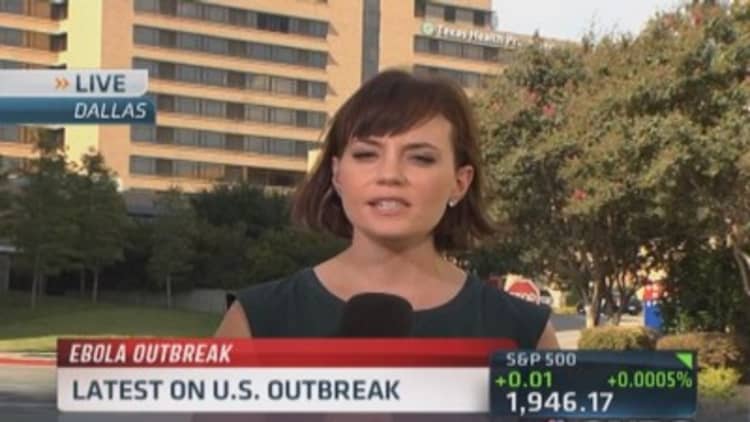Exxon Mobil announced on Thursday that it has banned employees to travel to areas most affected by Ebola, as the disease has disrupted its operations in West Africa, including future plans to drill off the shore of Liberia.
Shares of the energy firm fell after the news.
Separately, The Associated Press said Liberia officials will prosecute the man who brought Ebola to the United States for lying on a health form.
Passengers leaving Liberia are being screened for fever and asked if they have had contact with anyone infected. U.S. Ebola patient Thomas Eric Duncan arrived in the United States on Sept. 20 and answered "no" to those questions, a questionnaire obtained by The Associated Press showed.
Neighbors told the wire service that Duncan had helped a sick pregnant woman who later died of the disease. Her illness at the time was believed to be pregnancy-related.
Centers for Disease Control and Prevention Director Tom Friden confirmed Thursday that Duncan did not have any signs of a fever when he was screened at the airport, and did not feel any symptoms until four days after arriving in the United States.
Binyah Kesselly, chairman of the board of directors of the Liberia Airport Authority, told reporters on Thursday that Duncan will be prosecuted when he returns to Liberia.
Under care in a U.S. hospital, Duncan is still in "serious" condition, the Texas Health Presbyterian Hospital said on Thursday.
"The doctors on the medical staff and nurses at Texas Health Presbyterian Hospital Dallas continue to provide compassionate, quality care to the patient who tested positive for Ebola Virus Disease," the hospital said in a statement.
Duncan, a Liberian national, only began showing symptoms of the disease after he arrived in the United States.

While public health officials do not think the U.S. is at risk of seeing a domestic outbreak of Ebola on the scale of West Africa, authorities are still concerned.
Meanwhile, the United Nations warned that Ebola could become airborne and mutate, in a report from The Telegraph.
Anthony Banbury, the UN Secretary General's Special Representative on the disease, said in the article that the longer the Ebola virus exists, the more likely it could mutate and spread via the air, causing an unlikely but possible "nightmare scenario."
The Texas Department of State Health Services has temporarily widened its examination net to 100 people, from 80, to include people who may have had even slight contact with the Ebola patient.
"We are working from a list of about 100 potential or possible contacts and will soon have an official contact tracing number that will be lower," Texas Department of State Health Services spokeswoman Carrie Williams said. "The number will drop as we focus in on those whose contact may represent a potential risk of infection."
Although they have not shown symptoms of Ebola, four people have been quarantined in a Dallas apartment, officials said. The city has provided food, educational support and police embeds for security in the apartment complex.
"We do not intend to have to do that again," city officials said at a press conference on Thursday afternoon.
Read MoreDon't panic over Ebola, a survivor says
Dallas Mayor Mike Rawlings emphasized that the issue was confined to the neighborhood in the northeast of the city.
"I feel very good. The city is nervous but the city is not scared," Rawlings told CNBC's "Closing Bell." "The issue is really West Africa, not Dallas. One resident just ended up in our city and we're going to take care of it."
He added that while he still regarded the hospital highly, its failure to report the Ebola symptoms immediately over the weekend was "obviously a miss."
School attendance in the area has dropped about 10 percent to around 86 percent, officials said. All hospitals in the area have been equipped to deal with another Ebola patient, if necessary.
Earlier, NBC News had cited Dallas County in reporting that about 80 people had come into contact with Duncan or one of his family members before he was hospitalized and diagnosed with the disease on Tuesday. The contacts will be investigated and monitored to determine their actual proximity to Duncan and his family in North Dallas.
These investigations include as many as 18 people, including school-age children, who had direct contact with Duncan, officials said.
Read MoreWhat we know about the Texas Ebola patient
Authorities have not confirmed whether or not Duncan was already showing symptoms of the virus when he or his family in North Dallas came into contact with those people.
As for the future of America's response to Ebola, Frieden admitted that "it is not impossible" that individuals like Duncan will come into the country and then develop symptoms. The CDC director emphasized that the only way to eliminate this risk is to end the outbreak in West Africa.

